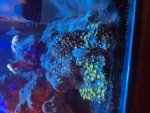Overfeeding any tank will cause issues and should be understood by everyone or you’re going to have a hard time getting things going. Nothing good happens fast, this statement has been around for decades in this hobby, yet people ignore it all the time. People watch some YouTube videos, read forum posts/threads and think they can start a tank and be successful? A very small percentage may get lucky, but my guess is a majority will fail or have serious issues in the beginning because they don’t understand the fundamentals of reefing. The absolute is this, if you think you can starve out algae by lowering your nutrients, you will have problems and most likely fail. For example; say you have a tank with an algae outbreak, you initially have 20ppm of N and 0.3ppm of P. We start to lower nutrients by whatever means you choose, yet the algae is still going strong. Now we get aggressive and really lower our nutrients and you test your water and get zero NO3 and 0.02 PO4, yet the algae is still going strong. What do you do? You can take N and P to zero and there would still be algae, why? We effectively lowered the nutrients to starve the algae, yet it’s still growing. I’m not saying you don’t want to have your nutrients at reasonable levels, that’s not what I’m talking about here, but the idea of lowering nutrients to manage the algae isn’t working, why? Algae can utilize trace amounts of nutrients and trace elements to survive, yet those same conditions would cause corals to starve. The reason algae doesn’t overtake corals on a reef is the presence of herbivores. Remove those herbivores and see what happens? Martin Moe wrote about these concepts in the late 80’s, so this isn’t new information, yet how many reefers these days read books on the hobby? My tank currently has about 1ppm of N and usually 0.25+ppm of P, yet the only algae I have is coralline and some valonia here and there. Why isn’t my tank overrun by algae? I also feed 6-8 times a day, do no water changes and run halides, so why is this possible?
Sent from my iPhone using Tapatalk



